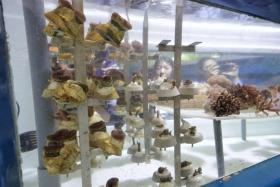Air quality affects productivity: Study
Research on taxi drivers in Singapore shows they drove 14 minutes less each day there was haze
When the haze hit Singapore in 2015, many people developed respiratory symptoms.
Schools were closed and people stayed in. Retailers lost significant foot traffic.
But the negative impact of haze does not stop in the area of health or retail revenue. It also affects the efficiency and extent of labour supply.
For those working in industries where work takes place outdoors, when the sky is shrouded with haze, how long would you stand working outdoors?
While much attention has been paid to the impact of the haze on the tourism and construction sectors, it seems the quality of the air you breathe might affect how productive you are at work.
Our research on a group of taxi drivers in Singapore shed some light on this.
At the National University of Singapore (NUS), we studied taxi drivers from 2009 to 2012 and found they drove less when air quality worsened.
While we were not able to study the behaviour of taxi drivers in 2013 when Singapore experienced one of its worst haze episodes, our study suggests even a slight change in air quality is sufficient to impact their decision on whether to drive.
Comparing the air pollutant index across days, we found taxi drivers drove less by 14 minutes each day the PSI reading moved from good to moderate.
Considering the fact that the average driving time when PSI is below 50 is 521.77 minutes a day, this decrement in driving time translates into a 2.7 per cent drop from the average time a taxi driver spends on the road.
So it appears when the air quality worsens, it is likely there will be fewer taxis on the road.
When we plotted the time taxi drivers spend on the road against PSI levels, we found every increase in the PSI by 50 led to a reduction of 30 minutes of driving.
This effect is greater at higher PSI levels, and we expect taxi drivers to drive a few hours less when the PSI reaches the unhealthy and hazardous range.
Interestingly, we also found taxi drivers did not take a longer break from driving to seek temporary reprieve but stopped driving altogether when the pollution condition worsened.
In fact, many took shorter breaks to try to earn as much as possible before calling it a day when the air quality is poor.
Additionally, we are mindful that when air quality is hazardous, people stay indoors and few are on the road, resulting in lower demand.
BETTER AIR QUALITY LEADS TO BETTER PRODUCTIVITY
That poorer air quality affects other aspects of economic life including our own productivity is not a finding unique to Singapore.
A study on labour efficiency of workers at a manufacturing facility in China found that labour efficiency drops when air quality worsens.
Another similar study conducted in the United States observed that an increase of ozone exposure by 10 ppb (parts per billion) resulted in a 5.5 per cent drop in productivity.
Despite working in the comfort of their cab, taxi drivers are less productive when there is air pollution because it is inevitable that they will be exposed to the pollutants the moment they step outside of their home.
Some may have fallen ill too, affecting their productivity.
Whatever the case might be, we must be mindful of the effects of poor air quality on our personal productivity and what this means to the economy when such occurrences like the haze take place.
As much as the air pollution is a health threat, it is also an economic challenge.
Prof Sumit Agarwal is Low Tuck Kwong Professor of Finance at NUS Business School. Prof Sing Tien Foo is the Dean's Chair Associate Professor and Director at NUS Institute of Real Estate Studies. Mr Koo Kang Mo was a PhD student at NUS.
Get The New Paper on your phone with the free TNP app. Download from the Apple App Store or Google Play Store now

